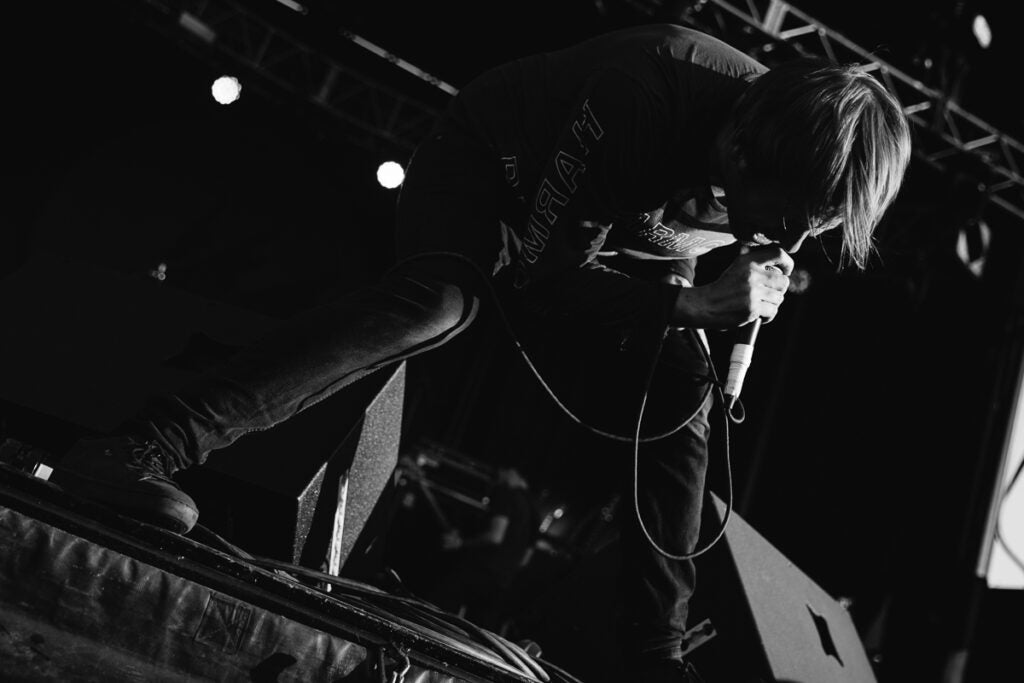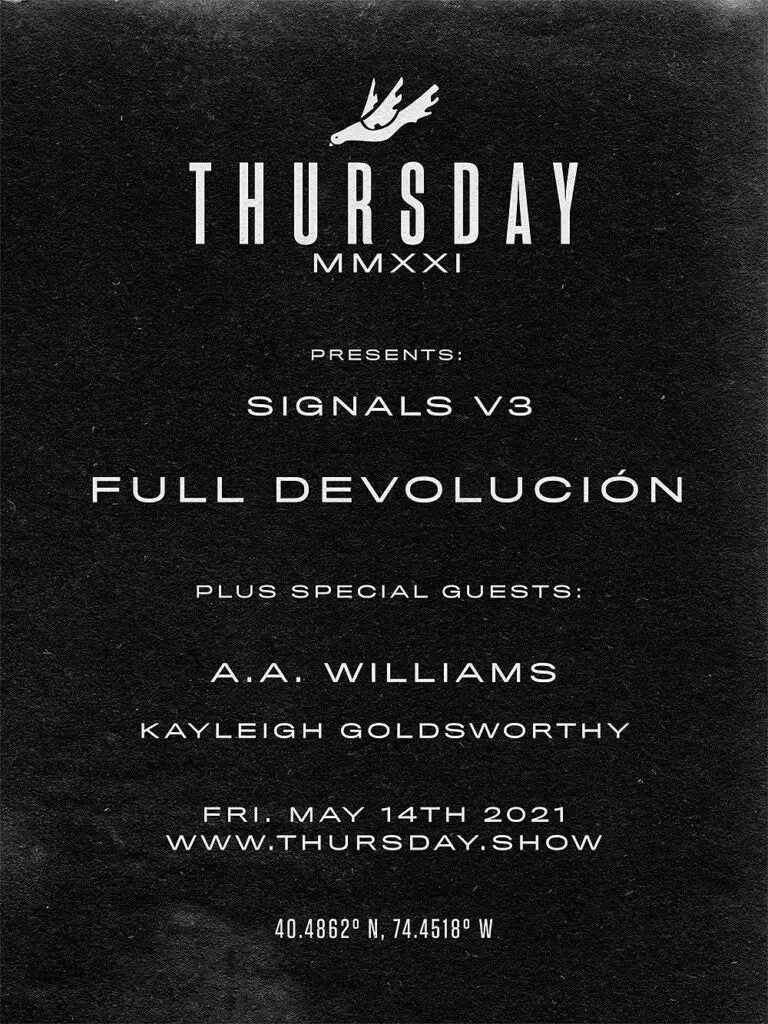Written by Yvonne Villasenor
When post-hardcore group Thursday formed in 1997, the then 18-year-olds were putting on basement shows, making flyers at Kinkos and pasting them around town to spread the word to locals.
Fast forward over two decades later, and they’re preparing for their third ticketed livestream event ‘Signals V3 – Full Devolución.’
The special livestream show will celebrate the twentieth anniversary of their sophomore album, Full Collapse, and the tenth anniversary of their latest full-length, No Devolución, on May 14. It will feature additional performances by Kayleigh Goldsworthy and A.A. Williams.
Previous editions of their ‘Signals’ livestreams included surprise appearances from members of My Chemical Romance, Against Me!, Coheed and Cambria, Texas Is The Reason and Quicksand.
The idea for Thursday’s virtual shows started after their summer tour with Cursive and And So I Watch You From Afar — which was planned but never announced — was cancelled due to the pandemic last year.
Thursday initially thought to record material and send it to each other to put out some kind of album. However, they felt they’d be limiting their creative chemistry.
“We’re a chemistry band, so that doesn’t really work over the internet,” frontman Geoff Rickly tells KNOTFEST. “We have to be in a room playing. We’ll be rocking together, and it’s just like everything happens. It’s not like we plan it. It either happens or it doesn’t.”
The band decided they’d get together and think of ways to engage the audience with a cinematic livestream performance and explore the narrative possibilities with it.

Rickly says ‘Signals V3’ is “the most ambitious” of the bunch and relates each livestream to a movie sequel. Thursday will be playing the most songs they’ve never performed for a stream. They will even be playing some songs live for the very first time.
“Each sequel, maybe it gets a little bit dumber, but it gets higher production value and crazier ideas happening…We're just like, ‘It's got to be over the top. This is the third and final blockbuster,’” Rickly says. “We’re like, ‘Look, either way, we're going down in flames or it's gonna be glorious. It's gonna either be the best thing or kids are gonna go, ‘Wow, they really screwed that up.’ This one’s the most ambitious…the most over the top. Some of the ideas are just crazy. Some of them probably literally can't work. So, we'll see what happens.”
Rickly recalls the moment he realized the internet was actually going to “be a thing” and change his life was when Thursday performed a record release party for Full Collapse.
“It’s a big show — maybe 600 or 700 people. For us at the time, that was a huge show. We went on stage and started playing, and there were 100-200 people that already knew all the words to Full Collapse,” Rickly says. “I couldn’t understand how since the record didn’t actually come out until that night.”
That night, a fan told Rickly he downloaded a leaked album off a message board and listened to it that way.
“It was like, ‘Oh, you’re going to be able to get stuff on the internet,’” Rickly says. “Now, everybody gets their music online, and you’re seeing bands play live online…It’s such a change. It used to be that only bands like Metallica could make a movie and people go to a movie theater to see it. Now, any band can go online and anybody can view them in another country. It’s pretty incredible.”
In addition to their innovative approach to livestreams, Thursday have gone above and beyond to make the experience special for all their fans.
“One of the things we realized after a while was — as hard as we had it
Thursday have made it possible for fans facing unemployment to get tickets and merchandise through donations from the band as well as from fellow Thursday fans who’d like to pay it forward. This, Rickly says, has created a sense of community and sparked friendships within the live chats during the shows.
Keeping fans connected through music adds to the excitement of Thursday performing albums Rickly considers “book ends to the band’s sleepless decade.” For him, Full Collapse and No Devolución act as snapshots from 20 years ago and 10 years ago.
“In a lot of ways, I'm more amazed by the 20 year snapshot because the things that I love about that record are how little I knew about music, and it still magically kind of came together. And it worked,” Rickly says. “It was this perfect little idea that started so many other bands down a path of opening up new genres and new ideas, but we didn't know what we were doing at all. We were just a bunch of kids trying to have some fun and do something that sounded different to us…Now, I hear somebody who doesn't know anything about life basically yet, just has all these ideas and all these feelings.”
“Then I hear the record from 10 years ago, No Devolución. I hear somebody that became so jaded after 10 years of being in a band and having been married and divorced; all these different life experiences and all this time on the road,” Rickly says. “It's just like, ‘Oh wow, that was me at the bottom of an arc.’ I was depressed and thought I knew everything. Now, I feel much more full circle. I feel much closer to the person I was 20 years ago than the person I was 10 years ago.”
Rickly explains the energy, hopefulness and innocence he had as a young musician motivated his creative visions and experimentation in doing what hadn’t yet been explored within the hardcore genre.
Growing up as a self-described “goth kid” and loving bands like The Cure, New Order and Joy Division, Rickly became a fan of industrial, punk and hardcore music.
He remembers meeting AFI frontman Davey Havok in the late ‘90s, who was wearing a Joy Division shirt. The two shared their love for the post-punk genre and wondered why bands didn’t encompass more of its characteristics into their sound.
“I thought that it would be a really good contradiction for us to have a hardcore band that was all about softness,” Rickly says. “To me, that was the appeal of the kind of music that Thursday was making and the kind of art that our friends and we were embarking on with this kind of new, exciting direction for punk and hardcore.”
Rickly attributes postmodern writers to have a major influence on his songwriting. Writers like Don DeLillo, Donald Barthelme and David Foster Wallace stood out to Rickly for their ability to take traditional stories and add unexpected twists to make everything seem unreal.
“To me, the way that technology was moving, society was moving, politics were moving, everything already felt slightly unreal. I was very attracted to surrealism that wasn’t totally surreal. It was pretty much real, but something about it seemed off,” Rickly says. “Those things all put together — hardcore that was soft and a writing style that was slightly surreal but still very much about what it’d feel like to live in the modern world — was how Thursday came about that. That was the collection of everything we wanted to be about.”
Thursday influenced countless bands in the late ‘90s and early ‘00s with their unapologetic take on hardcore, leading to a new wave of emo bands. The most popular of the bunch being My Chemical Romance.
The band would go on to influence groups like La Dispute, Touché Amoré and Deafheaven.
Rickly gives his take on why the genre exploded at that point in time and references an essay he read from the 1950s that related artists to bees.
“She
“That’s why music comes in waves. Often, a genre pops up and then there are a hundred great bands. They're all working on the same ideas, but they all have their own personality. I think if there wasn’t a Thursday, there would’ve been another Thursday maybe six months later…I really do believe there’s just something about an idea that moves through a generation,” Rickly says. “Taking Back Sunday, My Chemical Romance, Circa Survive — we all kind of felt this idea shaking in the ground and picked it up and ran with it, and that’s why it happened.”
The emergence of the genre has become what is considered by some to be one of the major moments of rock ‘n’ roll of the last hundred years. To this day, it’s remembered through “emo nights,” people still identifying with the culture and books written on the beloved Myspace era. It is a cultural moment Rickly says he is “very, very honored” to be a part of.
The New Jersey band who began their journey as bright-eyed, energetic teenagers are now in their 40s and remain lively, passionate and fueled by their love for music.
Because of Thursday’s formation, Rickly has been able to experience what it’s like to travel across the world doing what he loves, and, as a single child, understand what it’s like to have brothers. He says if the 18-year-old version of himself knew he’d still be playing music with the band over 20 years later, “he’d probably call me a sellout.”
“I had this idea when I was younger that punk music is for kids to play. It’s all ages shows, kids playing music for kids. ‘Don't trust anybody over 30, let alone 40. You don't have anything worth saying anymore.’ Now, I have to laugh at that kid and be like, ‘Dude, I feel so much the same as I did when I was 18,’” Rickly laughs.
He continues, “You think when you get older that you change as you grow up and you become dignified. No, I read the same books. I listen to the same music. I know a little bit more because I've experienced a lot more. I realized at some point the secret is nobody ever really grows up. Robert Smith of The Cure is 20 years older than me. It’s like, ‘You’re the same as you’ve ever been; you just love music, and you’re still awesomely goth. You’re just cool.’”
Signals V3 – Full Devolución will be streamed live from locations in New Jersey, Philadelphia and London at 7:30 p.m. EST on Friday, May 14. Tickets are available HERE.





